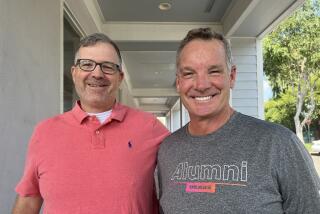Kramer Vs. Kramer : N.C. State Quarterback Erik Kramer Does Battle With Himself and Leans on Supporting Cast to Lift His Career
RALEIGH, N.C. — A sense of wonderment, as much as anything else, seems to fuel the drive to excel in Erik Kramer.
That same sense of curiosity prompted Karl Kramer to pack up and move across the country, from Canoga Park to Wake County, N.C., to monitor his son’s football career up close.
How good can Erik become if he continues to practice after everyone else has gone home?
How smart can he become if he continues to study game films at night?
You can’t blame them for wondering.
Only four years ago, North Carolina State’s record-setting quarterback was a frustrated defensive back at Burroughs High in Burbank. His football career, in his words, “had no future.”
Only last year, when he had finally been given a chance to be the starting quarterback at Pierce College in Woodland Hills, he broke his left wrist in the second game of the season. A doctor told the right-handed Kramer that falling on it a certain way could damage the wrist permanently. He told him that his season was over.
But, with a second opinion and a soft cast allowing him to continue playing, Kramer became a junior college All-American in his first full season as a quarterback.
And now, after his father, sister and girlfriend have moved across the country to lend their support, the 6-1, 194-pound junior is the No. 1 passer in the Atlantic Coast Conference.
Kramer this season established school records of 16 touchdown passes and 2,510 passing yards while completing 58.5% of his attempts. With a similar season next year, he’ll be the Wolfpack’s all-time leading passer. After only one season, he already ranks sixth on the school’s all-time list.
He accomplished all this while playing on a 3-8 team with an injury riddled offensive line so porous that he was sacked a staggering 45 times. And he did so while playing the last half of the season with a double hernia.
How far can his ability take him?
Kramer, 21, isn’t sure, but he’s not about to leave any stone unturned while trying to find out.
His philosophy can be summed up in one sentence.
“All I want to do,” he said, “is make the most I can out of every play.”
It was cold and dark last Saturday as North Carolina State closed out its season against Duke University in Durham--about 30 miles down the road from N. C. State’s campus in Raleigh.
Karl Kramer, 44, sat with a date at Durham’s Wallace Wade Stadium. Erik is Karl’s spitting image. Both father and son are handsome men, tall and trim with thick, dark hair and light-colored eyes. When Ed Seaman, North Carolina State’s Sports Information Director, was first introduced to Karl, he thought he was meeting Erik’s brother.
Karl’s life has been as radically altered by football as his son’s. After starting divorce proceedings from Eileen, his wife of 21 years, and after his 14-year-old daughter, Kelley, had completed her school year, he left his job as a salesman and moved to join Erik in North Carolina. He brought Kelley with him.
“There was no reason for me to stay in California,” he said.
He works as a sales representative for Southern Tele-Communications.
Karl loves North Carolina and plans to stay after Erik graduates in the spring of 1987. Last summer, he paid $79,000 for a brand new four-bedroom house about a block outside the Raleigh city limits.
He shares the house with Erik and Kelley and Erik’s fiance, Marshawn Linville, an aspiring actress who also moved from California and now works as a waitress.
“I don’t feel so alone out here,” said Erik.
Every Saturday, they go to a football game. Last Saturday, they watched as North Carolina State fell behind against Duke, 10-0, less than two minutes into the game.
Karl was not discouraged.
Looking around the half-filled stadium, he said: “This is basketball country, but next year, you watch, we’re going to kick butt, and it’s going to be football country.”
Karl, obviously, is more than a casual fan. Once, when Erik believed he would be better off transferring from St. Genevieve High School, Karl rented an apartment with him in Burbank so he could transfer legally to Burroughs. This season, he went to all but one game, home and away.
And, even though Erik would throw for a school-record and ACC season high of 342 yards against Duke, Karl complained throughout the game about the Wolfpack’s “conservative” offense.
Late in the first quarter, when N.C. State failed to score on three running plays from the two-yard line, Karl yelled: “You’ve got to throw it in.”
Later, when the Wolfpack fell behind, 17-3, Karl wondered why the coaches hadn’t gone to a shotgun formation.
“It’s the best thing we do,” he said, “and we don’t do it until we get way behind. It’s so frustrating. I’ve been watching this all season.”
He smiled in the second quarter when the Wolfpack finally lined up in the shotgun.
“Game’s over,” he said. “We’ll kick their butt now.”
Just then, Erik’s pass got away from running back Frank Harris and was intercepted by Duke linebacker Jim Godfrey.
“The pass was there,” Karl said. “It just bounced out of his hands. That’s Erik’s 12th interception and six have bounced off receivers’ hands.”
Duke went in to score and led at halftime, 24-3.
“This is a sorry game,” said Kelley, who had made her way through the stands to get some money from her father.
“It will be tough to come back,” Karl said, “but we’ll do it if we go to the shotgun.”
In the fourth quarter, Erik threw a touchdown pass to Jerome Staton out of the shotgun and the Wolfpack had pulled to within 12 points.
“Some day,” Karl said, grinning broadly, “these coaches are going to listen to me. He’ll eat you up out of the shotgun.”
Midway through the quarter, however, after the Wolfpack reached Duke’s 18-yard line, Erik threw four straight incomplete passes into the end zone.
Karl was silent.
With 1:41 left, a roughing-the-kicker penalty gave Duke a first down.
“It’s a wrap,” said Karl.
Duke won, 31-19.
Karl introduced his son to sports at age 2. When Erik was 9, he joined a Pop Warner football team and for four years, Karl said, Erik’s teams never lost a game.
Erik continued his football career at St. Genevieve, but in his sophomore year, he suffered a separated shoulder. The next season, he sat on the bench. He decided he’d be better off at Burroughs.
At Burroughs, however, he played behind Rich Strasser, who now plays for San Francisco State. Kramer was used exclusively as a defensive back for the last 10 games of the season.
But, “for some ignorant reason,” he said, sitting in the living room of his father’s colonial-style house last Sunday, he still thought he could be a quarterback.
“There was no reason for me to believe I could play based on past achievements,” he said, “other than the fact that I thought I had the ability.”
The next obstacle was mononucleosis, which wiped out his first year at Pierce. In that year of decision, Kramer would not have been eligible to play anyway because he didn’t take enough units. The next year, however, he was eligible but wound up sitting behind Dave McLaughlin, who is now at Oregon State.
Finally, last season, he got a chance to start.
And then he broke his wrist.
Dr. Melvin Hayashi of Thousand Oaks fitted him with a soft cast to wear in the games, and the Pierce coaches designed an offense in which Kramer ran plays exclusively from the shotgun. Kramer stayed after practice with the coaches, watching films until 8 or 9 almost every night.
Pierce was 10-0 before losing to Taft in the Potato Bowl. For the season, Kramer threw for 2,574 yards and 21 touchdowns.
“I thought I had the talent,” he said, “but I had never really put my mind and body into it. I had never worked as hard as I should have to prepare.”
Several major colleges came after him, including Illinois, Pittsburgh and Tulane. He liked North Carolina State the best, though, because the Wolfpack had no other quarterbacks returning this season.
He won the starting job in spring practice, but he has continued to work. At night, he watches game films at home, and more than once he has been caught on the practice field after the lights have been turned out.
He switched his major this fall from pre-med to speech communications, he said, “because I can’t concentrate on anything else during football. I’m kind of single-minded. Whenever I have some free time, I watch films or meet with the coaches.”
He is driven, he said, by a desire to see how far he can push himself.
“I see a lot of people given a great opportunity like I’ve been given and not making the most of it,” he said. “I don’t want to just float by and be content with being average.
“I’m not the most gifted athlete, so I have to work for everything I get. Basically, I just try to stay ahead of other people by finding an edge.”
His edge, said Wolfpack Coach Tom Reed, is his mental approach.
“His off-the-field preparation, his intensity, allows him to go into a game and have it not be that big a deal,” Reed said. “For Erik, everything is intense, so when he gets on the field, it’s just routine. He then can perform extremely well.”
The same intensity allows Kramer to play through pain. He was injured in the sixth game of the season when he hit the ground awkwardly with his knees spread apart after being struck from behind by a Pitt player. Hernia surgery performed today at the Rex Hospital in Raleigh is expected to repair the damage.
Despite the injury, he missed only part of one game, and he returned in that one to rally the Wolfpack from a 17-6 fourth-quarter deficit to a 20-17 victory at South Carolina.
Later, he told the Raleigh News and Observer: “I’ll do anything to play. Every game is so precious, and I can’t see throwing one away. It’s not so much courage, it’s just the fear that I’m not getting everything out of myself. How do you know you can play with pain if you don’t try?”
And how do you know how far your talent can take you if you don’t give it a chance to develop?
That’s one thing Kramer will never know.
More to Read
Go beyond the scoreboard
Get the latest on L.A.'s teams in the daily Sports Report newsletter.
You may occasionally receive promotional content from the Los Angeles Times.










